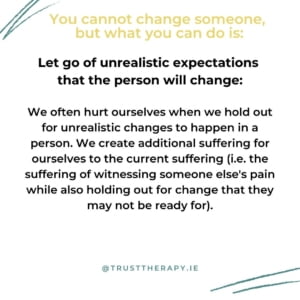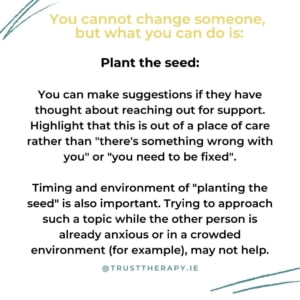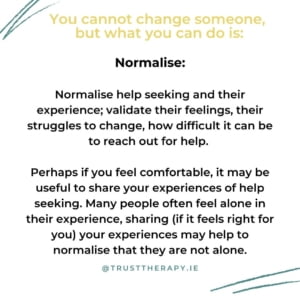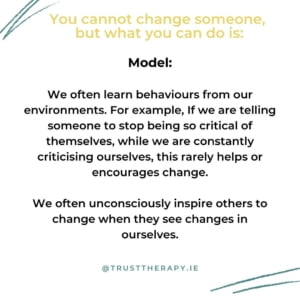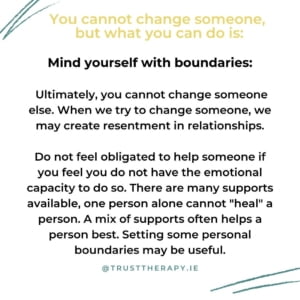It can be difficult to witness our loved ones engaging in unhealthy behaviours and habits and not reaching out for help or having any desire/motivation to change.
It is hard when we make many attempts to help, but they do not want to be helped.
If change was so easy (for either ourselves or for someone else), it would have been done long ago.
Before change, there is often fear, resistance, ambivalence. Often our current behaviours serve us in some way – some need gets met.
Change is scary and we often fear what we don’t know, even if the change could improve our situation.
I’ve added some tips on what you may be able to do to help.
Remember: It is hard enough to change ourselves, never mind someone else.
Words in images:
You cannot change someone, but what you can do is:
- Let go of unrealistic expectations that the person will change: We often hurt ourselves when we hold out for unrealistic changes to happen in a person. We create additional suffering for ourselves to the current suffering (i.e. the suffering of witnessing someone else’s pain while also holding out for change that they may not be ready for).
2. Plant the seed: You can make suggestions if they have thought about reaching out for support. Highlight that this is out of a place of care rather than “there’s something wrong with you” or “you need to be fixed”.
Timing and environment of “planting the seed” is also important. Trying to approach such a topic while the other person is already anxious or in a crowded environment (for example), may not help.
3. Normalise: Normalise help seeking and their experience; validate their feelings, their struggles to change, how difficult it can be to reach out for help.
Perhaps if you feel comfortable, it may be useful to share your experiences of help seeking. Many people often feel alone in their experience, sharing (if it feels right for you) your experiences may help to normalise that they are not alone.
4. Model: We often learn behaviours from our environments. For example, If we are telling someone to stop being so critical of themselves, while we are constantly criticising ourselves, this rarely helps or encourages change.
We often unconsciously inspire others to change when they see changes in ourselves.
5. Mind yourself with boundaries:
Ultimately, you cannot change someone else. When we try to change someone, we may create resentment in relationships.
Do not feel obligated to help someone if you feel you do not have the emotional capacity to do so. There are many supports available, one person alone cannot “heal” a person. A mix of supports often helps a person best. Setting some personal boundaries may be useful.
